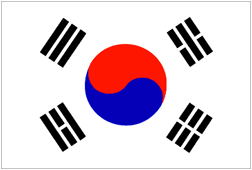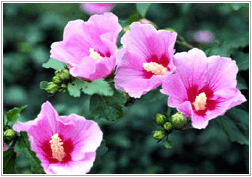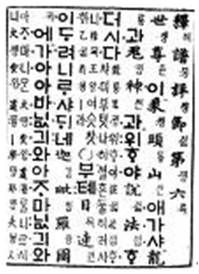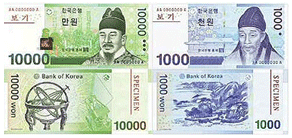Republic of Korea
The Republic of Korea is located in the southern half of the Korean Peninsula and is bounded by ocean to the east, west and south and by North Korea to the north. It closely neighbors China to the west and Japan to the east. The total area of the country is 100,000 square kilometers which is about the same as Ohio in the United States. Lowlands make up only 30% of the total land, because the country is mostly mountainous. Jeju-island which is located about 100 kilometers off the southern coast of Korea is the largest island and notable tourist place in the country.
National Flag: Taegeukgi
The Korean flag is called "Taegeukgi" in Korean.
Its design symbolizes the principles of the yin and yang in oriental philosophy.
The circle in the center of the Korean flag is divided into two equal parts.
The upper red section represents the proactive forces of the yang. On the other hand,
the lower blue section represents the responsive cosmic forces of the yin.
The circle is surrounded by four trigrams, one in each corner.
Each trigram symbolizes one of the four universal elements:
heaven ( ),
earth ( ),
earth ( ),
fire ( ),
fire ( ),
and water ( ),
and water ( ). ).
|
 |
National Flower: Mugunghwa (Rose of Sharon)
 |
The national flower of Korea is Mugunghwa, rose of sharon. Every year from July to October, a variety of Mugunghwa blossoms graces the entire country.
“Mugung” in the name of flower means immortality and this word accurately reflects the determination and perseverance of the Korean people.
|
Language: Korean (Written form: Hangeul)
|
Hangeul , Korea’s official alphabet, was first invented by King Sejong during the Joseon Dynasty.
Originally it was called Hunminjeongeum, the language is consisted of 17 consonants and 11 vowels.
However, since then, 3 of the originally established consonants and 1 vowel had fallen into disuse, so it became 24 of the total letters.
Syllables are formed by the selective combination of vowels and consonants to create words.
The official name for the Korean language was changed to 'Hangeul' in 1910. Hunminjeongeum Proclamation Day was called ‘Gagya Proclamation Day’ up until 1926, and it was changed to its current title in 1928, ‘Hangeul Proclamation Day’.
|
 |
Climate: Four distinct seasons
Korea has four distinct seasons: Spring is warm and windy; Summer is hot and humid; Fall is cool and clear; and, Winter is cold dry. Seoul, the capital of Korea, is located at 37 degrees North latitude, and at 127 degrees East longitude. Its yearly average temperature is 12.7 degrees centigrade, with the average temperature of June at 22 degrees centigrade and the average temperature of January at -3.4 degrees centigrade.
Currency and Banks
|
The Country's currency is the won (KRW). The exchange rate in recent months is around 1500 KRW for 1 USD. Foreign currencies can be exchanged at airports and government-designated banks. Most of the stores in Korea only accept Korean currency, or KRW, so it is advised that visitors exchange to Korean currency at the airport. Major credit cards are widely accepted, and traveler's checks may be accepted by tourist-oriented shops and at most international tourist hotels and banks. Banks open from 09:00 to 16:00, Mon-Fri and are closed on weekends and public holidays.
|
 |
Culture
Korea has a very long and proud cultural heritage. Like most cultures, Korea has its corpus of etiquette and taboos. Korea also has a number of major traditional holidays, each one with its own unique customs and traditions. Koreans are a very understanding people, but it still helps to learn a little about the host nation’s culture before setting off for a visit.
Contemporary Culture
Despite Korea’s rich ancient culture dating back millennia, you`d be mistaken if you believed that Koreans stilllive in the past. Korea has an amazingly vibrant contemporary culture that is now taking the rest of the world by storm. Korean filmmakers are winning accolades at major international film festivals for their creativity and cinematic genius. Korean dramas, meanwhile, are winning fans throughout the Asia-Pacific region by providing an image of modernity coupled with a distinct Asian identity. Korean popular music is doing much the same---converging the genres of music developed in the West such as hip-hop and pop with Korea`s unique cultural ethos to produce a distinctly Asian form of music that is universally enjoyable across national and cultural barriers.
Folk customs
Every country has its own folk customs and festivals. Korea is no different. Korea has a wealth of annual celebrations and festivals, some of which have been celebrated for thousands of years. Two of these celebrations, Chuseok and the Lunar New Year, are kept by extended holidays, mass visits to ancestral hometowns and a variety of traditions and practices. Many of Korea`s folk festivals also reflect the country`s root as an agricultural society and shed light on worldview of the ancestors of today`s Koreans.
For more information please see :
http://english.visitkorea.or.kr/enu/index.kto
Crime Reporting & Police
Fire and Medical Service
Linked to Korea Travel Phone
Medical Referral Service
Information Service
International Call Service
Information Service
Local telephone number guide
International Telegram Service 00795
Jeju Call Center
Korea Travel Phone
|
112
119
1330
1339
International call 00794
00799
Telephone number of where you are located
Local area code + 114
00795
120
1330
|


 ),
earth (
),
earth ( ),
fire (
),
fire ( ),
and water (
),
and water ( ).
).



